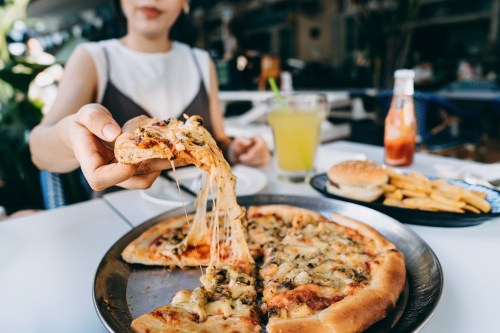Our editors independently select these products. Making a purchase through our links may earn Well+Good a commission
Do a quick Google search for celeb-endorsed wellness trends, and you’ll see one result on repeat: the ketogenic diet. This buzzy regimen involves eating lots of fat and very few carbs, which puts your body into ketosis—a state wherein you start burning fat for fuel. By swearing off spaghetti in favor of salmon, say the keto-faithful, you’ll be rewarded with more energy, mental focus, and rapid weight loss. And yet, with the diet’s strict nutrient ratios and restrictive list of approved foods, actually achieving and staying in ketosis isn’t easy.
So when Jordan Younger, the wellness blogger also known as The Balanced Blonde, wrote a post about how she achieved ketosis through an alternative method—one that supposedly boasts the added benefits of reducing inflammation, preventing disease, and increasing longevity—I was intrigued.
That method is water fasting, or consuming nothing but water for extended periods of time. At the beginning of 2018, an Ayurvedic doctor advised Younger to take a three-day water fast to help heal a bad outbreak of eczema and hives. When that didn’t fully clear up her skin, she checked in to a wellness center for a supervised, three-week water fast. And while ketosis wasn’t her goal, it turned out to be one side effect of relinquishing mealtime.
This isn’t exactly surprising, since fasting is a staple of the keto diet. Some experts believe that by giving your body a break from digestion, it can kick your system into ketosis while freeing up energy for your cells to repair themselves. (More on that in a minute.) But while keto-style intermittent fasting involves taking around 12 hours off from eating, water fasting requires going days at a time fueled only by H2O. In return, say experts, more prolonged ketosis and a deeper level of cellular repair can occur.
It’s an extreme approach, to be sure—one that, on the surface, doesn’t sound very healthy. So why are some experts recommending it as an efficient route to healing? To get the inside scoop on the risks and benefits of long-term fasting, I spoke with three nutrition pros who are well-versed in this ancient practice that’s making its way into modern day regimens.
Here’s everything you need to know about the controversial practice of water fasting.

Why some believe water fasting has healing benefits
Just like acupuncture and herbalism, water fasting’s roots run deep. Sages like Aristotle, Socrates, and Hippocrates swore by the practice for its purported purification and healing abilities. Plus, it makes an appearance in the texts of almost every religious tradition.
Fast-forward to the 21st century, and modern science shows these elders may have been on to something. While few studies have been conducted on human test subjects, early research on animals has found that depriving the body of calories for 24-48 hours promotes autophagy—a cellular clean-up process that may help stave off diseases like cancer and Alzheimer’s.
According to Josh Axe, D.N.M., C.N.S., D.C., founder of Ancient Nutrition and DrAxe.com, the list of benefits goes on from there. “There’s clinical research on fasting for weight loss and things like epilepsy,” he says.
As if those potential benefits weren’t mic-drop-worthy on their own, a 2015 experiment on rats revealed that autophagy might also extend your lifespan. Both Dr. Axe and Joel Fuhrman, MD, author of a fleet of fasting books including Fasting and Eating for Health, believe that when your body’s not expending energy digesting, that same energy will work to heal your body from the inside out. And, perhaps, elongate your life.

Why water fasting induces a ketogenic state
So what’s this have to do with ketosis? A quick biology primer: The digestive cycle includes two phases—anabolic and catabolic. During the anabolic phase, you’re eating and digesting, while during the catabolic phase, you’re living off stored calories and nutrients. During the first phase, the body stores glycogen as glucose—a simple sugar that your brain counts on for energy once you’ve reached the resting, catabolic phase. Skip a meal (or three) though, and your glucose supply will eventually run out.
Luckily, your body has a backup plan. “The body is smart. It doesn’t want to waste muscle tissue,” explains Dr. Fuhrman. “So after it sees that no food is coming, after like 16-24 hours of not eating, the brain develops the ability to accept ketones [from fat stores] as an alternative fuel to save muscle.” Cue weight loss, energy, mental clarity, and more.
Yes, this is essentially the same thing that happens when you’re eating a low-carb, high-fat diet—your body is forced to adapt to burning fat for fuel. So why go to the extreme of cutting out food altogether? It all comes back to autophagy. Since you’re still eating and digesting on the keto diet, the autophagy benefits don’t occur. And, remember, autophagy isn’t believed to kick in until you’ve reached the 24-hour mark with no food—so even keto-style intermittent fasting isn’t likely to get you there.

The potential risks of long-term fasting
While the benefits of going no-cal may seem enticing at first glance, Bonnie Taub-Dix, RDN, creator of Better Than Dieting and author of Read It Before You Eat It: Taking You from Label to Table, urges you to consider your intentions before clearing out your fridge.
“My bottom line on this is why? What are you doing this for?,” she asks. “If you’re doing it to cleanse your body, there are other ways that you could cleanse your body by eating foods. Science shows us that your liver, your kidneys—they are detoxifiers. You don’t need to ‘detox.'”
She also warns that there are physiological risks that come from going extend periods without grub. First and foremost, going on and off of fasts frequently can cause your blood pressure to plummet then spike over and over again. “It could also cause low blood-sugar levels for some people—especially if they’re more prone to hypoglycemia,” Taub-Dix adds. “That erratic nature of living, whether it’s erratic weight changes, or blood pressure changes, or a blood sugar surge—that wreaks havoc on your body, so that’s not a positive state to be in.” Noted.
What’s more, Taub-Dix maintains that while a liquid diet may help you lose weight quickly, its lack of sustainably is likely to set you back in the long run. “Losing weight by doing this kind of diet—or any really restrictive diet—and gaining it back is like having a successful business that then flops,” she explains.
One compromise? Dr. Axe often recommends his clients try a keto fast, where you fast for 16 hours a day (including the time when you’re asleep) and eat all of your food within an 8-hour window. Again, for the eating cycle that’s just right for you, you’ll need to touch base with a nutrition professional. And you should avoid fasting altogether if you’re pregnant, breast feeding, or have a history of eating disorders. But before you do that, take a cue from Taub-Dix and reflect on how, exactly, you want to design your way of life.
“Living so that you can enjoy your life means including one of the greatest pleasures in life—eating,” she says. “I see a lot of people that come to my practice after they’ve tried a lot of these diets, whether it’s paleo, keto, or whatever, and it just isn’t working for them in their lives.” In other words, if ditching dinners for the sake of longevity means missing out on cauliflower pizza night with your BFFs, is it really worth it?
You can also heal by eating. These are the foods you should be eating if you’re dealing with eczema and the ones you should stock up on for optimal hormone balance.
SaveSaveSaveSaveSaveSaveSaveSaveSaveSaveSaveSave
SaveSaveSaveSaveSaveSaveSaveSave
SaveSaveSaveSaveSaveSave
Sign Up for Our Daily Newsletter
Get all the latest in wellness, trends, food, fitness, beauty, and more delivered right to your inbox.
Got it, you've been added to our email list.











